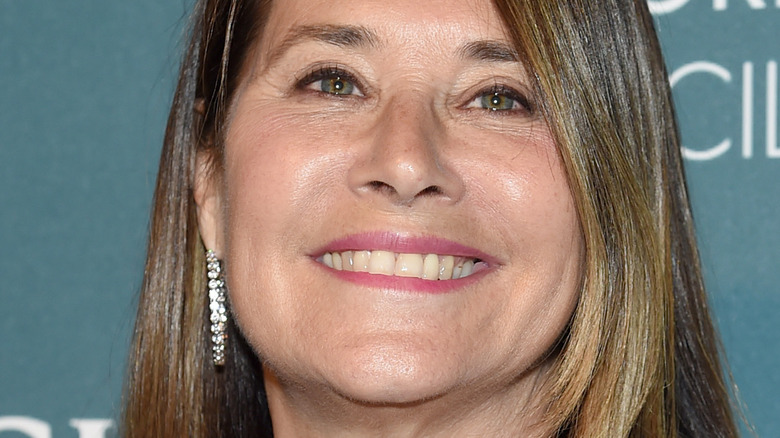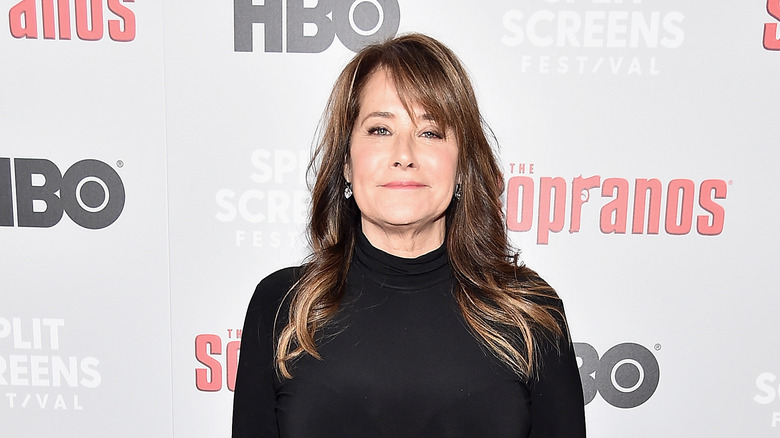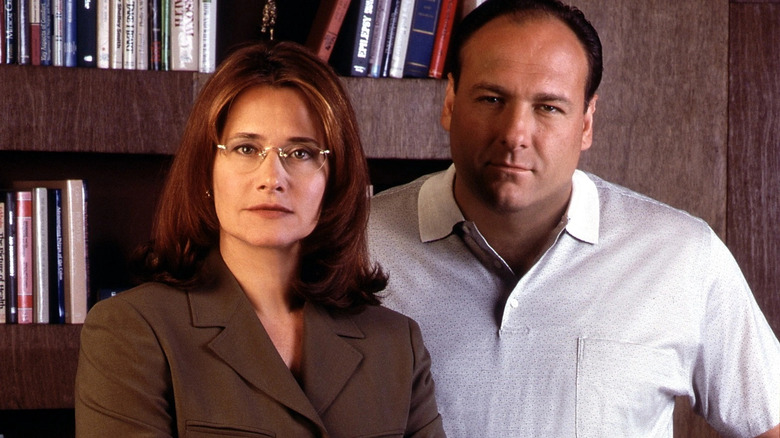Why The Sopranos' Lorraine Bracco Turned Down The Role Of Carmela For Dr. Melfi
When you read the name "Lorraine Bracco," the first thing that comes to mind may be her striking visage — the face of a former French model — or her career-defining, Academy Award-nominated turn as Karen Hill, the loyal wife of mobster Henry Hill (Ray Liotta) in Martin Scorcese's seminal work "GoodFellas." More likely, however, is that what permeates your mind is not an image or bit of trivia, but a sound — a rough voice, simultaneously firm and genuine, that distinguished the actor ever since she attained mainstream prominence. A memorably blunt timbre made all the more iconic when used in tense therapy sessions opposite TV's greatest antihero — Tony Soprano.
An early harbinger of the rise of prestige television, David Chase and HBO's "The Sopranos" is rightly considered one of the greatest programs ever produced — in fact, it has been definitively stated as such by the likes of TV Guide, Rolling Stone, and the Writers Guild of America (via Deadline). From superb scripting to meticulous directorial execution, the series is nothing short of a masterpiece (even if we have to ignore a few things in hindsight), bolstered by one of the finest casts in television. Though Bracco's "Sopranos" character is well remembered (her performance garnering four Emmy nominations), she almost played another character entirely.
Who was Lorraine Bracco on The Sopranos?
Lorraine Bracco played Dr. Jennifer Melfi, a psychiatrist who begins seeing the titular mafioso Tony Soprano after he succumbs to a nasty panic attack at his home in New Jersey. Throughout the series, the pair develop an unlikely and often toxic relationship, with Dr. Melfi at once tormented and excited by the ethical implications of treating a career criminal, as Tony himself uses what lessons he learns in therapy to better manipulate those around him.
The character is as deftly written as she is portrayed by Bracco, a therapist so refreshingly imperfect that debate around her efficacy continues to swirl (a quandary this Vice article explores in detail). Despite the kismet pairing of Bracco and Mefli, as well as the palpable chemistry between her and her late co-star James Gandolfini, series creator David Chase originally had a different role in mind for her — he wanted her to play the equally complex yet vastly different Carmela Soprano, Tony's wife.
Why did she turn down Carmela Soprano?
Though ABC News relates that Bracco "fell in the love" with Chase immediately upon meeting him, the pair weren't yet on the same page as to the best way to use her talents. Chase had a clear image of her as Carmela in his head — an image similar to the one shared by the rest of Hollywood, in the wake of her "GoodFellas" performance. In Vanity Fair's "An Oral History of the Sopranos," the actor stated that after the film she was "offered every Mafia gal, girl, wife, mistress, daughter available." In her mind, this was a bridge she had already crossed with incomparable success. Still, Bracco loved the script as much as she loved Chase himself — so she told him plainly that she wanted a different role.
In Dr. Melfi, she saw potential. She informed Chase of her opinion, leading to her eventual casting as the most infamous psychiatric practitioner on TV. The role of Carmela would, of course, ultimately be offered to Edie Falco (Falco was nominated for six Emmys as Carmela, winning three). The trio of Gandolfini, Falco, and Bracco is a large part of why the show worked as well as it did, with their drastically conflicting personalities creating the friction that kept the show engagingly tense even in its quietest moments. For Bracco specifically, "The Sopranos" added another iconic performance to her impressive résumé, and solidified her as one of the strongest leading actors in TV history.


